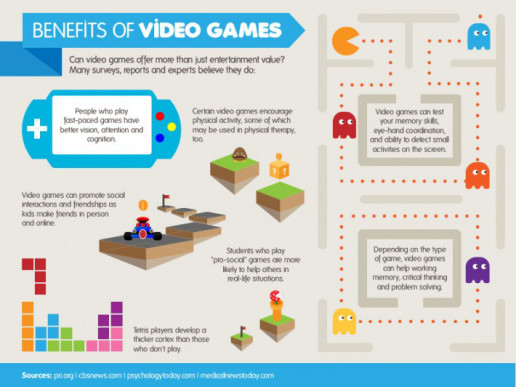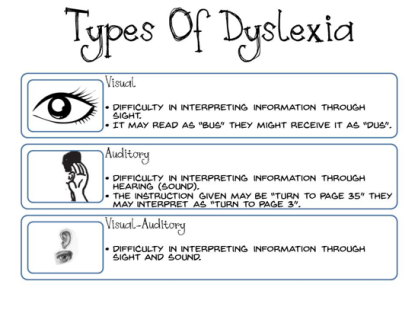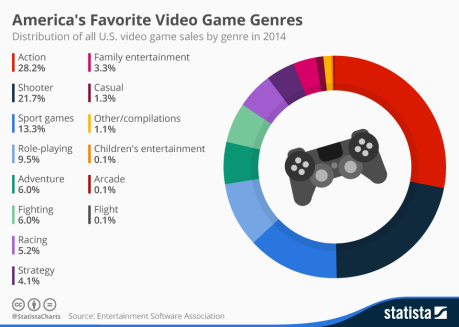In October of 1958, William Higinbotha pioneered the first ever piece of technology known to be a ‘video game’. Beginning as just an elementary adaptation of a tennis game, Higinbotha couldn’t begin to dream of what he had begun. Now in 2017, there are more than two-billion video game players world-wide. Just here in the United States, sixty-three percent of households have at least one person that spends a duration of over three hours a week dedicated strictly to video games.
Today, in the United States, 91% of children between the ages of 2 and 17 play video games. Since this muli-billion-dollar industry has become such a present part of our society, it’s expected for people, specifically parents to have reservations. Forbes even states “Parents tend to approach video games like junk food: games are fine in moderation but ultimately they are an evil temptation that’s more bad than good.”
Sadly this assumption made by most parents doesn’t carry any basis. Opinions aside, there’s psychological proof that links playing video games during adolescence to creativity, better problem-solving skills, enhanced memory, and even more advantages that we’ll address. With this in mind, parents still seem to protest any sort of ‘screen-time’ for their children. Let’s change that archaic idea.
According to a recent study done by Isabel Granic and published by American psychologist, video games can foster real world psychological benefits. Granic suggests that the nature of video games has changed drastically in recent years. Video games have become increasingly complex, diverse, realistic, and social in nature. Research has emerged that summarized the positive effects of video games specifically focusing on the four main domains of cognitive, motivational, emotional, and social.
Before delving further into the advantages, let’s distinguish video games from other forms of media such as movies, TV shows, etc. for the sake of accurate debate. The largest recognizable contrast is that video games are fully interactive. This requires a ‘gamer’ to actively engage not only with their console, but with other players’ behaviors and actions as well. Contrary to conventional beliefs that state playing video games incites laziness and aggression, scholars have speculated that video games are an excellent source for developing basic problem-solving skills.

In-game puzzles can range in difficulty from finding the quickest route from point A to point B, to uncovering complex action sequences based on memorization and repetition. Game developers typically don’t provide any sort of, or very little instruction about how to solve in-game problems. This provides players with nearly a blank canvas to brainstorm a vast amount of possibilities utilizing their past experience along with their gut intuition. In short, it forces gamers to think quickly, while being innovative and creative.
Studies have validated that video games also have a role in children’s creative competence. Linda Jackson, a professor of psychology, who published “Computers in Human Behavior” took a sample of almost 500 12-year old students and was able to demonstrate and confirm, that video game playing was positively associated with imagination and creativity. Interestingly enough, she did discover that children’s use of other forms of technology like the internet, computers, and smart phones did not relate to enhanced creativity.
Furthermore, another study done by Prensky, writer of “From Digital Natives to Digital Wisdom: Hopeful essays for 21st century learning” argues that exposure to games that provide open-ended problems has crafted a generation of children growing up as ‘digital natives’. He proposes that instead of learning in a more conventional way of linear instruction (like reading a manual for example), many young children will problem-solve strictly through trial and error. Children will collect evidence that’s tested through their experimentation.
An article in Psychology Today written by Peter Gray a research professor at Boston College, states that not only does video games improve executive functioning (such as problem-solving skills that we discussed), but they also have an extensive role in attention and vigilance. Gray confirms that video games facilitate advancement in  children who suffer from Dyslexia at a young age.
children who suffer from Dyslexia at a young age.
“Dysexia, in at least some cases, seems to derive from problems of visual attention. One study showed that as few as 12 hours of video game play improved dyslexic children’s scores on tests of reading and phonology (Franceschini et al, 2013). In fact, the improvement was as great or greater than that achieved by training programs that were explicitly designed to treat dyslexia.” This study has confirmed that in some cases, video games can correct dyslexia in children. The study displayed that video games help enhance spatial attention, reduce impulsiveness, and improve visual contrast sensitivity. In case, that aids the visual attentiveness that helps children suffering from Dyslexia, better interpret information via sight.
If video games are proven to make an impact even on a medical level when it comes to dyslexia, then where do parents’ and caretakers’ skepticism come from? “Against this backdrop of the nearly ubiquitous play, the popular press regularly pulses out urgent warnings against the perils of addiction to these games and their inevitable link to violence and aggression, especially in children and adolescents.” states American Psychologist. Most psychological research is poured into the negative effects of gaming and the potential harm related to aggression, addiction, and depression. It’s unlikely that this focus will diminish because video games are being utilized as a scapegoat for pinpointing the reasons why we may have aggressive or lazy youth.
A recent precedent took place in 2012 when information about the Sandy Hook Elementary School gunman emerged. It stated that he enjoyed playing first-person shooter video games. President Obama then immediately requested congress to allocate $10 Million dollars to research on the impact of violent media specifically in video games.
To further explore the relation of video games and Adam Lanza, the Sandy Hook gunman, we have to explore all the facts. If 91% of children between the ages of 2 and 17 engage in playing video games (as I stated previously), and Adam Lanza started to experience social-emotional challenges after 4th grade, can we really tie video games directly to his violent behavior? Seems as if there’s more at play when dictating what went wrong. Analyzing this as this as a concerned mother, he did engage in “shooter” video games, not just your basic Tetris, Minecraft, or FIFA, so wouldn’t that make a difference in aggression?
 Actually, No. According to a census that collected video game sales by genre in 2014, the second largest category of video games played by Americans is shooter games. So are video games truly making our children aggressive, lazy, or depressed? Or are we just feeding into the media’s portrayal of video games out of fear?
Actually, No. According to a census that collected video game sales by genre in 2014, the second largest category of video games played by Americans is shooter games. So are video games truly making our children aggressive, lazy, or depressed? Or are we just feeding into the media’s portrayal of video games out of fear?
Since the video game industry didn’t become prevalent until around the late 80s, it’s understandable why people, specifically parents of the baby-boomer generation, may question the impact gaming would have upon their children or grandchildren. Ideas and concepts that aren’t familiar to us are always ‘scary’ at first.
This was discussed in conversation with a mother of two, Kimberly Taylor. When asked if she found video games to be beneficial to her 8 year old daughter and 16 month old son, she stated absolutely so, and believes that children learn best through play. Kimberly mentioned that she uses video games as a form of positive reinforcement in her household, but tries to limit her children’s screen time to around an hour a day. Kimberly even stated that her children enjoy an interactive game called Smarty Ants that guides her children to further evolve and establish their reading skills. Although Ms. Taylor believes video games can be a beneficial tool to be utilized in schools, she doesn’t believe that it can replace traditional means for learning.
Casey Nichols, an Indianapolis special needs elementary school educator further expounded on the topic of video games being utilized as a way to educate young children. When asked if there’s a benefit to using video games in the classroom, Professor Nichols stated “I would say video games are definitely engaging for kids. If I use any form of technology in my classroom, I know I will have the kids’ attention for the most part. At the same time, I have seen students just as engaged in traditional activities. Technology is certainly a part of their world, that’s undeniable. They should have access to it, but it shouldn’t be used primarily as a tool for education.”
Whether or not the benefit of video games is great enough to proceed with replacing more traditional means of learning in the classroom, it’s undeniable that video games do have a positive impact on a young child’s development. Video games can be utilized specifically for learning, or more frequently just for some after-school fun. Although preconceived assumptions have given video games a lousy reputation, there’s no reason why a parent shouldn’t give their child an opportunity to both play, and be able to improve their cognitive, motivational, emotional, and social skills in the meantime.
Resources:
This Month in Physics History. (n.d.). Retrieved September 06, 2017, from https://www.aps.org/publications/apsnews/200810/physicshistory.cfm
Tenebruso, J. (1970, January 01). 21 Video Game Stats That Will Blow You Away @themotleyfool #stocks $MSFT, $SNE, $NTDOY, $EA, $ATVI. Retrieved September 06, 2017, from https://www.fool.com/investing/2017/02/25/21-video-game-stats-that-will-blow-you-away.aspx
Shapiro, J. (2014, August 27). A Surprising New Study On How Video Games Impact Children. Retrieved September 06, 2017, from https://www.forbes.com/sites/jordanshapiro/2014/08/27/a-surprising-new-study-on-how-video-games-impact-children/#4a6fc9b87556
Granic, I., Lobel, A., Engels, R., & Anderson, Norman B. (2014). The Benefits of Playing Video Games. American Psychologist,69(1), 66-78.
Jackson, L. A., Witt, E. A., Games, A. I., Fitzgerald, H. E., von Eye, A., & Zhao, Y. (2012). Computers in Human Behavior.
Gray, P. (2015, February 20). Cognitive Benefits of Playing Video Games. Retrieved September 06, 2017, from https://www.psychologytoday.com/blog/freedom-learn/201502/cognitive-benefits-playing-video-games
Franceschini, Sandro, Simone Gori, Milena Ruffino, Simona Viola, Massimo Molteni, and Andrea Facoetti. 2013. “Action Video Games Make Dyslexic Children Read Better.” Current Biology 23:462–66.
Katersky, A., & Kim, S. (n.d.). 5 Disturbing Things We Learned Today About Sandy Hook Shooter Adam Lanza. Retrieved September 06, 2017, from http://abcnews.go.com/US/disturbing-things-learned-today-sandy-hook-shooter-adam/story?id=27
087140
Advertisements Share this:






